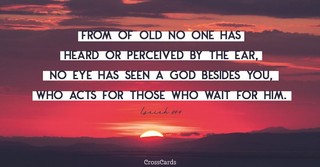
- Recent Translations
- All Translations
Isaiah 64:9
Share
Settings
Images for Isaiah 64:9

Isaiah 64:9 Meaning and Commentary
Be not wroth very sore, O Lord
They knew not how to deprecate the displeasure of God entirely; having sinned so greatly against him, they were sensible they deserved his wrath; but entreat it might not be hot and very vehement, and carried to the highest pitch, which would be intolerable: neither remember iniquity for ever;
to afflict and punish for it, but forgive it, for not to remember sin is to forgive it; and not inflict the deserved punishment of it, but take off and remove the effects of divine displeasure, which as yet continued, and had a long time, as this petition suggests; and therefore suits better with the present long captivity of the Jews than their seventy years' captivity in Babylon. Behold, see, we beseech thee, we are all thy people;
look upon all our troubles and distresses, and upon us under them, with an eye of pity and compassion; and consider that we are thy people, not only by creation, but by covenant and profession; even everyone of us; or we are all the people thou hast, the Jews looking upon themselves to be the special and peculiar people of God, and the Gentiles as having no claim to such a relation; this is the pure spirit of Judaism. The Targum is,
``lo, it is manifest before thee that we are all of us thy people.''